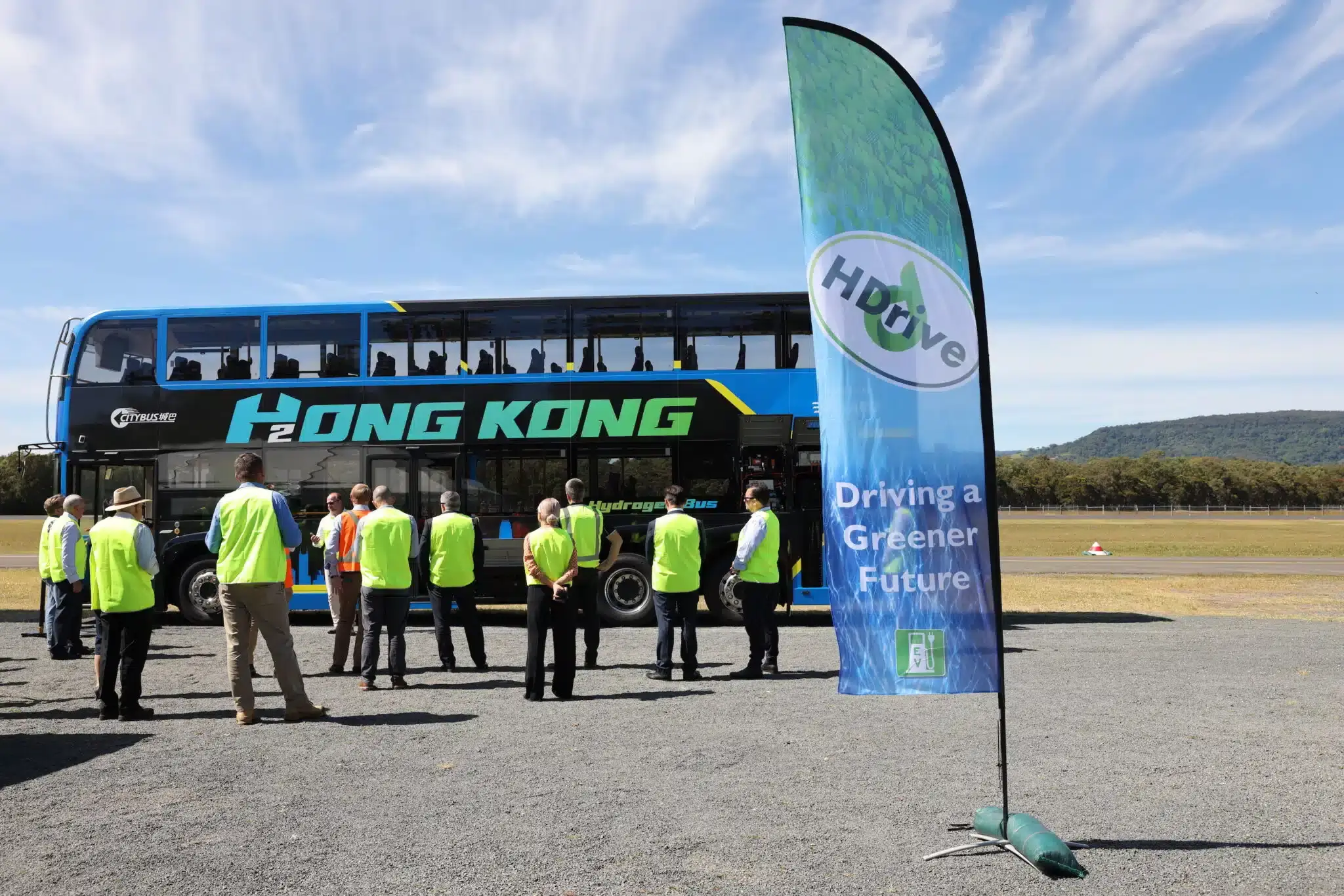HDrive has revealed a hydrogen fuel cell double decker bus along with an electric shuttle bus at a media event at Shellharbour airport and says the buses may be assembled in Australia at some point in the future.
The company has been launched to market zero emission vehicles as a specialist zero emissions distributor in Australia, specialising in hydrogen and battery electric vehicles.
The company revealed the buses, both made by Wisdom Motor with the hydrogen powered double decker using Ballard fuel cell technology, while the battery electric shuttle bus is a similar size to a Hino Poncho and will also form a part of the HDrive operation.
The hydrogen fuel cell bus has a capacity of 100 occupants including the driver, with 79 seated and 20 standing across two levels. The 11.98 metre bus has a height of 4.3 metres with a GVM of 22 tonnes.
HDrive says the Wisdom FC 120DD Double Decker has a top speed of 80km/h and a range on its hydrogen tanks of 300km, with the ability to refuel in around 5-10 min.
It is fitted with a 105.3 kWh battery with electricity provided from a Ballard fuel cell providing power to the ZF AVE 130 axle mounted electric motor, with ZF air suspension on all axles including the ZF RL 82 tag axle , while it runs disc brakes all around.
General Manager Ben Kiddle said it is HDrive’s intention to potentially invest in the manufacturing in the Illawarra around the area near the Shellharbour airport where he says it will also carry out vehicle development.
“There’s lots of opportunity for employment, lots of people are seeking employment, and lots of trade skills around the area as well,” said Kiddle.
Kiddle has worked within the industry and in the UK over the past 20 years and has hands on experience with hydrogen and battery electric buses during that time and brings that knowledge and skill to the task of running HDrive.
“It was a great opportunity for me to further my skills, my career in heavy vehicle industry and learnings for pushing city buses along with zero emission technologies,” he said.
15 years ago we were running Hydrogen buses in London, and now 15 years later we finally have a hydrogen bus here in Australia.
Kiddle said HDrive knows what the challenges are and what needs to be done to engineer these vehicles for Australian conditions.
“We’ve brought this double decker bus here to the Illawarra to demonstrate that hydrogen fuel cell technology is real and to show that it’s the ideal technology for use in the commercial transport industry,” he said.
Kiddle said that HDrive will have the largest portfolio of zero emission heavy passenger and commercial vehicles available in Australia.
“We will have solutions in battery electric and hydrogen fuel cell vehicles, ranging from four and a half tonnes to 70 tonnes in commercial, and from 13 passengers to 100 passengers in buses which could see a varying range of sizes,” said Kiddle.
“We intend to do more than just sell vehicles, we need to provide solutions for the industry,” he said.
“We work closely with our energy partners to ensure that vehicles are delivered with options for charging, hydrogen storage, supply and production solutions and to ensure that our customers are completely ready to drive their businesses to a greener future,” he added.
The president of Bus NSW John King, was on hand at the launch having already been an early adopter of battery electric vehicles during a trial on the South Coast of NSW in 2018.
“As president of Bus NSW, it pleases me greatly to see the hydrogen fuel cell bus behind us today,” said John King.
“In 2019 the industry was given a challenge to start transitioning the fleet to zero emissions, an ambitious challenge, however, our industry has always stood up, it always will stand up to bring the solution to government and not the problem,” he said.
HDrive is working with hydrogen suppliers and it is aiming to get the cost of hydrogen down to a parity with the cost of diesel.
“We believe we’re going to get it to a lot less than that, and we would be looking to drive partnerships with transport operators and all our energy suppliers, and we’ve already started that journey,” said Ben Kiddle.


